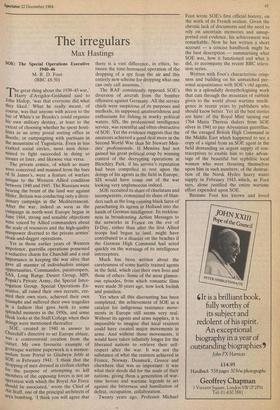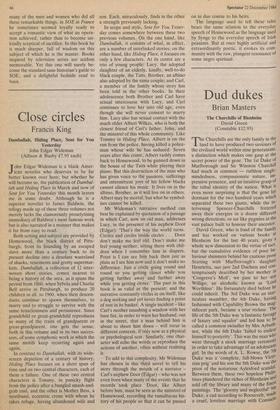The , irregulars
Max Hastings
SOE: The Special Operations Executive 1940-46 M. R. D. Foot (BBC £8.50) The great thing about the 1939-45 war,' Harry d'Avigdor-Goldsmid said to John Hislop, 'was that everyone did. what they liked.' What he really meant, of course, was that anyone with access to the bar of White's or Brooks's could organise his own military destiny, at least to the extent of choosing whether he spent hosti- lities in an army postal sorting office in Bootle, or campaigning with partisans in the mountains of Yugoslavia. Even in less exalted social circles, most men deter- mined to fight succeeded in doing so sooner or later, and likewise vice versa. The private armies, of which so many were conceived and manned from the bars of St James's, were a feature of warfare unique to the Western Allied condition between 1940 and 1945. The Russians were bearing the brunt of the land war against Hitler, Britain was conducting only a diver- sionary campaign in the Mediterranean. After the war, indeed as soon as the campaign in north-west Europe began in June 1944, strong and sensible objections were voiced by Allied commanders about the scale of resources and the high-quality Manpower diverted to the private armies' cloak-and-dagger operations.
Yet in those earlier years of Western IMpotence, guerrilla operations possessed a seductive charm for Churchill and a real Importance in keeping the war alive that gave all manner of individualists unique °Pportunities. Commandos, paratroopers, SAS, Long Range Desert Group, MI9, Popski's Private Army, the Special Inter- rogation Group, Special Operations Ex- ecutive, all raised their own recruits, cre- ated their own stars, achieved their own triumphs and suffered their own tragedies In a fashion that gave birth to some splendid memoirs in the 1950s, and some bleak looks at the Staff College when their doings were mentioned thereafter.
SOE, created in 1940 in answer to Churchill's directive to set Europe ablaze, was a controversial creation from the outset. My own favourite example of grotesque wartime paperwork, is a memor- andum from Portal to Gladwyn Jebb at SOE in February 1941: 'I think that the
for of men dressed in civilian clothes tor the purpose of attempting to kill Members of the opposing forces is not an °peration with which the Royal Air Force should be associated,' wrote the Chief of Air Staff, one of the principal architects of area bombing. 'I think you will agree that
there is a vast difference, in ethics, be- tween the time-honoured operation of the dropping of a spy from the air and this entirely new scheme for dropping what one can only call assassins.'
The RAF consistently opposed SOE's diversion of aircraft from the bomber offensive against Germany. All the service chiefs were suspicious of its purposes and methods, its supposed amateurishness and enthusiasm for fishing in murky political waters. SIS, the professional intelligence service, was resentful and often obstructive of SOE. Yet the evidence suggests that the amateurs achieved a good deal more in the Second World War than Sir Stewart Men- zies' professionals. If Menzies had not gained his great political coup by winning control of the decrypting operations at Bletchley Park, if his service's reputation had been compelled to rest upon the doings of his agents in the field in Europe, SIS would have come out of the war looking very unglamorous indeed.
SOE recruited its share of charlatans and incompetents, committed its share of blun- ders such as the long-running black farce of parachuting its agents in Holland into the hands of German intelligence. Its reckless- ness in broadcasting Action Messages to the networks in France on the eve of D-Day, rather than after the first Allied troops had begun to land, might have contributed to a disaster on the beaches if the German High Command had acted quickly on the warnings of its intelligence interceptors.
Much has been written about the carelessness of some hastily trained agents in the field, which cost their own lives and those of others. Some of the most glamor- ous episodes, from which romantic films were made 30 years ago, now look foolish and pointless.
Yet when all this discounting has been completed, the achievement of SOE as a catalyst for indigenous resistance move- ments in Europe still seems very real. Without its agents and arms supplies, it is impossible to imagine that local resisters could have created major movements in arms. And without those movements, it would have taken infinitely longer for the liberated nations to retrieve their self- respect after the war. It was not the substance of what the resisters achieved in France, Norway, Denmark, Greece and elsewhere that was so important: it was what their deeds did for the souls of their nations, giving them a generation of war- time heroes and wartime legends to set against the bitterness and humiliation of defeat, occupation, collaboration.
Twenty years ago, Professor Michael Foot wrote SOE's first official history, on the work of its French section. Given the chronic lack of documents and the need to rely on uncertain memories and unsup- ported oral evidence, his achievement was remarkable. Now he has written a short account — a concise handbook might be the best description — summarising what SOE was, how it functioned and what it did, to accompany the recent BBC televi- sion series.
Written with Foot's characteristic crisp- ness and building on his unmatched per- sonal acquaintance with SOE's old agents, this is a splendidly demythologising work that cuts through the mountain of rubbish given to the world about wartime intelli- gence in recent years by publishers who should know better. Yet all the best stories are here: of the Royal Mint turning out 1764 Maria Theresa thalers from SOE silver in 1941 to pay Abyssinian guerrillas; of the enraged British High Command in the Middle East which happened to see a copy of a signal from an SOE agent in the field demanding an urgent supply of con- traceptives to enable him to take advan- tage of the beautiful but syphilitic local women who were thrusting themselves upon him in such numbers; of the destruc- tion of the Norsk Hydro heavy water supply in February 1943, which, as Foot says, alone justified the entire wartime effort expended upon SOE.
Because Foot has known and loved many of the men and women who did all these remarkable things, in SOE in France he sometimes seemed loyally ready to accept a romantic view of what an opera- tion achieved, rather than to become un- kindly sceptical of sacrifice. In this book he is much sharper, full of wisdom on this subject of which he is the master. Books inspired by television series are seldom memorable. Yet this one will surely be- come the standard sane historian's guide to SOE, and a delightful bedside read to boot.







































































 Previous page
Previous page